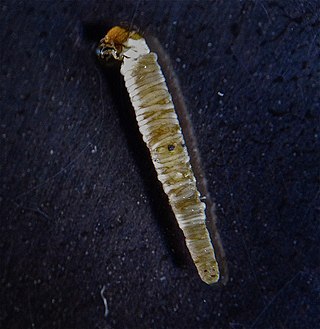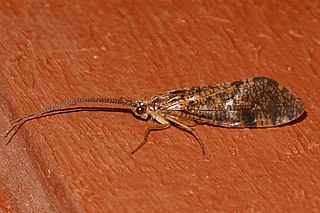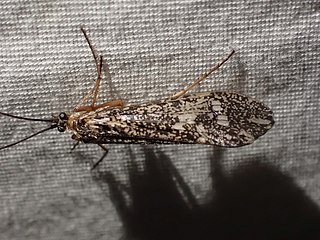
Micrasema is a genus of humpless casemaker caddisflies in the family Brachycentridae. There are more than 70 described species in Micrasema.
Phylloicus is a genus of caddisflies in the family Calamoceratidae. There are more than 40 described species in Phylloicus.

Mystacides is a genus of long-horned caddisflies in the family Leptoceridae. There are more than 20 described species in Mystacides.

Brachycentrus is a genus of humpless casemaker caddisflies in the family Brachycentridae. There are at least 30 described species in Brachycentrus.

Neophylax is a genus of autumn mottled sedges in the family Uenoidae. There are more than 30 described species in Neophylax.
Amiocentrus is a genus of humpless casemaker caddisflies in the family Brachycentridae. There are at least two described species in Amiocentrus.

Chimarra is a genus of little black caddisflies in the family Philopotamidae. There are more than 630 described species in Chimarra.

Chilostigmini is a tribe of northern caddisflies in the family Limnephilidae. There are about 12 genera and at least 40 described species in Chilostigmini.

Dicosmoecus is a genus of october caddis in the family Limnephilidae. There are about six described species in Dicosmoecus.

Banksiola is a genus of giant casemakers in the family Phryganeidae. There are about five described species in Banksiola.

Glyphopsyche is a genus of northern caddisflies in the family Limnephilidae. There are at least three described species in Glyphopsyche.
Parapsyche is a genus of netspinning caddisflies in the family Hydropsychidae. There are more than 20 described species in Parapsyche.
Psilotreta is a genus of mortarjoint casemakers in the family Odontoceridae. There are more than 30 described species in Psilotreta.

Ironoquia is a genus of northern caddisflies in the family Limnephilidae. There are about seven described species in Ironoquia.

Lenarchus is a genus of northern caddisflies in the family Limnephilidae. There are about 13 described species in Lenarchus.

Onocosmoecus is a genus of northern caddisflies in the family Limnephilidae. There are at least three described species in Onocosmoecus.

Clistoronia is a genus of northern caddisflies in the family Limnephilidae. There are about five described species in Clistoronia.
Anagapetus is a genus of little black caddisflies in the family Glossosomatidae. There are about seven described species in Anagapetus.
Homoplectra is a genus of netspinning caddisflies in the family Hydropsychidae. There are about 11 described species in Homoplectra.
Desmona is a genus of northern caddisflies in the family Limnephilidae. There are at least two described species in Desmona.












